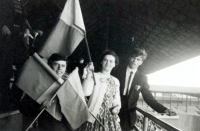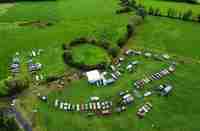Roscommon woman on dealing with a cancer diagnosis, and the importance of support services
In September 2023, Caoimhe Regan’s world changed overnight. Back in Roscommon for her grandmother’s funeral after completing a master’s in Occupational Therapy in England, she discovered a lump in her breast. Healthy, active, and with no family history of cancer, she approached the discovery calmly, but her GP’s immediate concern set a chain of events in motion. Within a week, she was at the Galway breast clinic undergoing tests, and by mid-October, she was diagnosed with triple-positive breast cancer.
“It was a major shock to the system,” Caoimhe recalls. Though her professional training gave her some insight into healthcare, it was a surreal experience for her: “Having worked in healthcare settings for over ten years, it’s a completely different ballgame when you’re on the receiving end of the advice”.
Despite the shock, Caoimhe showed incredible resilience, even preparing family and friends for the possibility of bad news as she awaited her results: “That week gave me time to think and process what was coming, even if nothing truly prepares you”.
New reality
Treatment began in November 2023, forcing Caoimhe to put on pause her career aspirations and return home to Ireland. Always busy, and working two part-time jobs while completing her master’s; playing Gaelic football, and maintaining a vibrant social life, she suddenly had to focus solely on getting through each day: “I needed the recovery time between chemo sessions, and something as simple as a walk or meeting a friend became really important”.
When she had good days, Caoimhe really did her all to embrace normality: “I was determined that when looking back… the end of 2023 and beginning of 2024… I didn’t want it to be all about cancer”.
By January 2024, she had connected with Vita House, a local support service in Roscommon Town. Here, she found activities like reiki, talk-therapy and reflexology, which became essential for her mental, emotional and physical wellbeing. Accepting support didn’t come naturally at first.
“As someone who has always been in the role of a caregiver, professionally, it was new and uncomfortable to be the one seeking help. But it’s something you have to embrace”.
As Caoimhe became familiar with her treatment and how she was responding to it, despite being very eager to get back to pursuing the career she had worked so hard for, she had to look for alternative positive distractions to give herself a boost.
“I’d have to really talk to myself and make the conscious choice to do the things I knew would make me happy, when I could”.
Thinking about the year that has been, Caoimhe recalled taking part in the VHI 10K Walk and the Walk-2K-a-Day-Challenge for Breast Cancer Ireland. And while working on being a full-time support worker for herself, Caoimhe also shared her experience last month at a panel discussion at Shannon Shopping Centre when she and others shared their experience of Breast Cancer at a Breast Cancer Ireland fundraising fashion show.
“Everyone’s journey is so different. Mine is so different to yours and Mary’s and John’s. There are so many factors at play that you can well imagine there isn’t a one-size-fits-all way to manage cancer or our response to it.
“For me, even things as simple as meeting friends for coffee, choosing to go on a friend’s hen (party) and so on, they were all normal things but looking back, those moments of positivity were so important for me”.
Realisations and advocacy
The experience left Caoimhe with a strong belief in the importance of accessible support groups. She is particularly passionate about creating a group at Vita House that offers a consistent presence for people during and after treatment.
“The hardest time can be when the physical side is dealt with, but the emotional and mental challenges remain. Peer support can provide not only advice but also a sense of connection”.
Caoimhe is also vocal about the need for better integration between cancer services. Her treatment at Portiuncula Hospital initially directed her to a cancer support centre in Ballinasloe, highlighting how referrals are often based on a hospital’s given geography rather than the individual’s. Greater flexibility, she believes, would benefit patients significantly. Additionally, oncology services signposting the types of available support services based on a particular patient’s needs was something she felt could be done more effectively for anyone going through cancer diagnosis and treatment.
Clearly thankful for all the support she has received, Caoimhe did note that there needs to be more joined-up thinking to ensure everyone going through a serious illness, particularly cancer, would be aware of the full range of supports available. Many of the ancillary supports provided by Vita House are not directly funded by the HSE but with voluntary groups and organisations around the country.
Her professional insight has also given her an appreciation for the role of complementary therapies such as those available at Vita House as well others such as massage which isn’t currently available at Vita House. “The studies are there, and these therapies play a bigger part in recovery than many realise,” she says, advocating for more recognition of their value.
Words of advice
For those navigating their own health concerns, Caoimhe’s message is clear: don’t ignore the signs. “Don’t be afraid to check yourself, see your GP, and ask questions. Early detection saved my life, and it could save yours too”.
Supporting others
Through her own experience, Caoimhe has come to admire the often-overlooked work of cancer support services. The Roscommon Cancer Support Service, operating under Vita House, plays a crucial role in helping people like Caoimhe through their journeys. They provide holistic therapies, mental health support, and community connections, all while navigating limited funding and recognition.
This Christmas, Vita House is hosting a series of events to bring light and comfort to those affected by cancer.
As Caoimhe focuses on her recovery and a future in occupational therapy, she remains a powerful advocate for the importance of early detection, peer support, and holistic care. Almost twelve months on from beginning treatment, her journey is one of resilience, but also a testament to the strength found in community and connection.






